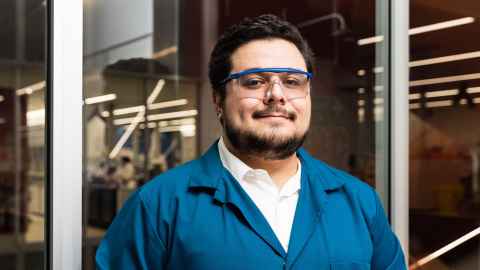Hugh Douglas Glossop
Having completed his PhD in Chemistry, Hugh has since pursued a postdoctoral position overseas.

Programme: Doctor of Philosophy specialising in Chemistry
“I’ve always had a fascination with scientific experimenting and was drawn to study a PhD in chemistry to pursue my interests in working with molecules as potential drugs/antibiotics. Synthetic antimicrobial peptide study combines a number of fields such as organic chemistry, microbiology, and medicinal chemistry so there is a lot of interesting overlap in possible research here.
“My thesis topic was the study of antimicrobial peptides and ways in which they can be synthetically modified to improve their activity. Key points of my thesis study include work on ultrashort peptides that are both antimicrobial and can form hydrogels, study of unnatural fluorinated amino acids, and synthetic peptide cyclisation through pyridinium salt formation.
“To condense this, the work basically revolved around designing and building short peptides with unnatural chemical structures as potential antibiotic drugs as well as the study of synthetic techniques for unnatural peptide structures.
“Research is much like a puzzle, requiring problem solving and creativity to solve, and ultimately it is rewarding…”
“The best part of the programme was the freedom to independently plan and execute projects, to satisfy curiosity relating to the study of chemistry on drug molecules and their potential biological effects.
“Research is much like a puzzle, requiring problem solving and creativity to solve, and ultimately it is rewarding to think e.g. 'Will this molecule function in the way I think?' and then be able to set out and find out the answer yourself.
“I received financial support during my studies after being awarded an University of Auckland Doctoral Scholarship.
“If you’re considering studying Chemical Sciences, creativity and personal interest can be important factors in maintaining a healthy relationship with research. Also, make a good habit of learning as much as you can from your peers, and not just about science. 'It takes a village' rings true in many projects, and much of my work benefited from networking with talented peers both local and overseas in collaborations.”